Voices of #FordHall2015
When students occupied Bernstein-Marcus last November to protest racial injustice at Brandeis, they cast a light on a nationwide campus movement — and expressed the university’s ethos.
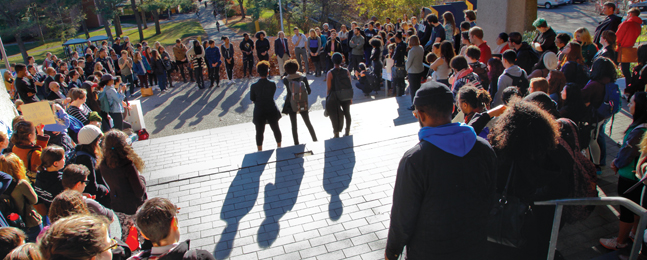
Mike Lovett
by Phillip Martin
Friday, Nov. 20, 2015, was an unusually warm fall day, ideal for an outdoor demonstration. Word spread fast around campus. Hundreds of students had marched to the Bernstein-Marcus Administration Center, and dozens were vowing not to leave until and unless Interim President Lisa M. Lynch responded to a list of 13 demands to make the campus more racially diverse and inclusive.
For 12 days, African-American students, in concert with classmates of Latino, Jewish, Asian, Arab and Anglo backgrounds, took over the hallway outside the president’s office, in the administration building. They demanded that, among other actions, the university increase by 10 percent the number of black faculty members employed in every department at the university, increase the number of admitted black students to 15 percent of the student body, include in the curriculum pedagogies that increase racial awareness, and hire a vice president for diversity and inclusion.
The student occupation at Brandeis followed a wave of campus activism at scores of colleges and universities last fall. Chanting “Fired up, won’t take it no more” and carrying placards affirming “Black Lives Matter,” students at Harvard, Tufts, Michigan State, UCLA and Emory, among other schools, held sit-ins and marches to demand swift and concrete changes.
The catalyst for many of the protests began in September at the University of Missouri, where black activists calling themselves Concerned Student 1950 (the first year African-American students were admitted to the university) demonstrated against racism. Their protests led to the forced exodus of top school officials who were accused of letting the school’s racial sores fester by failing to address credible complaints of racial harassment.
On Thursday, Nov. 19, Brandeis Student Union president Nyah Macklin ’16 and other leaders of the local movement drafted a letter to Lynch, giving her “24 hours to devise and publicly issue a plan that will address the demands we have presented to you.” (See the list of activists’ demands at bit.ly/1V6hQiz.)
The next morning, Nov. 20, Lynch responded to the letter, writing, in part, “[W]e must foster a just and inclusive campus culture that embraces the diversity of the larger society. In spite of having such a well-defined university mission statement, it is clear that we have not yet achieved the aspirations of that vision.” In the letter, Lynch promised a more detailed response following a planned 1:30 p.m. rally on the Rabb steps.
After the rally, student protesters made their way to Bernstein-Marcus. Calling themselves Concerned Students 2015, they had support from the Asian-American Students Association, Heller School for Social Policy and Management faculty, the Department of African and Afro-American Studies (AAAS) and other academic departments, and many alumni and students.
The student activists placed themselves in the hallway outside the president’s office, where they hung a banner from wall to wall announcing “We will not be moved.”
Negotiations began the first day of the protest in Lynch’s office. Although there were disagreements over language, the parties agreed on the general goal of “making Brandeis a more inclusive university.”
On the second day of the sit-in, the occupiers changed the name of the protest to #FordHall2015 in recognition of the 1969 Brandeis student protest, during which dozens of students took over Ford Hall and succeeded in attaining their chief demand: that the university create an African and Afro-American studies department.
On Nov. 25, students and administrators sat down for the second time, in the Hassenfeld Conference Center, to discuss the demands, work out an acceptable plan to increase diversity and inclusion on campus, and end the occupation.
The negotiating committee included Lynch; associate provost for academic affairs Kim Godsoe; dean of arts and sciences Susan Birren; senior vice president for students and enrollment Andrew Flagel; PhD candidate in neuroscience Stephen Alkins (for part of the first day); Macklin; Chinyere Brown ’17; Heller MBA candidate Miya Ward; Joanna Martin, a PhD student in Near Eastern and Judaic studies; and Heller MPP candidate Rima Chaudry.
During the negotiations with the student activists, Lynch also huddled separately with Godsoe, Birren and Flagel to discuss the list of demands. Lynch and her colleagues pushed back on the strict timelines and deadlines included in the initial list of demands. Lynch said she would not make unrealistic commitments. But she was sympathetic to the activists’ concerns and had stated in multiple forums since the beginning of her term as interim president that advancing diversity and inclusion was a key priority for her.
Twelve days after the occupation began, an agreement was reached. On the chilly afternoon of Dec. 1, outside the Bernstein-Marcus building, Lynch read aloud a joint statement summarizing the outcome. Holding a sheet of paper steady in both hands, she looked from side to side at the multi-hued assembly of students, and in a calm voice reaffirmed and accelerated Brandeis’ commitment to diversity, inclusion and racial justice.
The same day, the university released an implementation plan (read it at bit.ly/23VgnvW) that provided specific details regarding efforts to recruit more underrepresented faculty and students of color, improve mentorship of faculty and hire a chief diversity officer, among other initiatives.
This story focuses on a handful of lives that crossed during the course of the #FordHall2015 sit-in, as told to me in interviews conducted in March.
Phillip Martin is an award-winning senior investigative reporter for WGBH Boston Public Radio, a regular panelist for WGBH-TV’s “Basic Black” and a senior fellow at Brandeis’ Schuster Institute for Investigative Journalism.
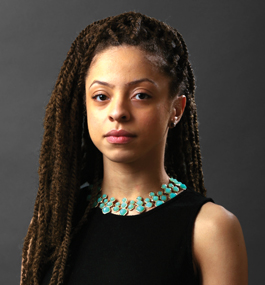
Mike Lovett
page 2 of 9
Queen White ’16
Born and raised in Atlanta, White also calls Harlem home. Her mother, she says, had always imagined naming her first daughter Queen, with all the respect the name confers. White graduated with a major in AAAS.
I was inspired by students who were uprising and protesting across the nation, black and brown students demanding answers as to why they are not included more, represented and cared for on campus. They have no visibility, and they feel like they don’t matter. And I know that when people hear “Black Lives Matter,” it’s death that’s associated with it. But, many times, you can be here in the flesh and not feel that you matter. And so we felt some of the same things that they were feeling [in Missouri and elsewhere], and we decided to join together.
[At Brandeis, the protest] was initially started by black women who gathered over the course of 24 hours and planned a “stand-in” — all black — to show solidarity with the students who were protesting. After that, we had to have a follow-up as to what we needed from our own university, and that turned into a list of demands, including having a person of color or persons of color in the health center, more black professors at the school, more community outreach for students who are black and brown.
I was there from the beginning, and there were times when I was helping with communication and social media, and there were times when I was helping to cook. So it changed based on the day and the action needed, but it was all in solidarity. We call it a “leaderful” movement, and we worked to create a safe space for everyone there.
Initially, our hashtag was #ConcernedStudents, and then it turned into #FordHall2015. We paid homage to [the protesters who occupied Ford Hall in 1969] to show that the fight continues and that it’s not post-racial. It’s very much still in our homes, in our schools and in our classrooms. We join together with them.
On a day-to-day basis, we strategized and also catered to one another because it was very much a healing space as well. It’s important that people know that.
White is working toward one day becoming a professor focused on environmental racism with a particular interest in arts education. She has helped fundraise for the residents of Flint, Michigan, a largely African-American community whose drinking water was contaminated by lead. She says, “Ford Hall was not the end of it. It’s an ongoing process of checking on and with one another regarding crises in America affecting black people and structural violence. It is another way of saying black lives matter.”
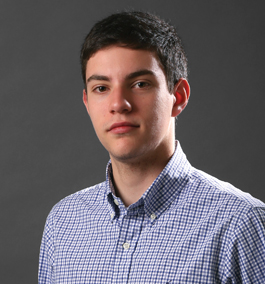
Mike Lovett
page 3 of 9
Andrew Jacobson ’19
Jacobson, an 18-year-old from Swampscott, Massachusetts, who completed his freshman year in May, is considering majoring in economics. He is a campus fellow at the Tikvah Fund and a staff writer at The Justice, where he wrote an editorial criticizing the 12-day occupation.
When I heard about the protest, my first thought was, “Is this campus really racist?” I have some friends of color here, and, from what I understand, they experience just as welcoming an environment as I do. Brandeis is known nationally for being a highly inclusive, liberal environment. Last year as I was touring this place, that was the one thing that Admissions spoke about most — how welcoming it was, how liberal. And I haven’t experienced the racism they purported existed. Obviously, I’m not a person of color, so maybe I don’t experience what they do.
And so one of the first things I did when the students took over Bernstein-Marcus was go in there. And I was genuinely curious about why they were sitting in and asked them a few questions, like “Do you really experience racism? What is it like?” And they called my questions inherently violent, which is something I didn’t expect; and they said if you’ve any further questions you can go online, we have an FAQ on our website. And so I went to the website, and one of the first questions was, “Do we really experience racism on this campus?” And in the answer portion, they said this question is inherently violent.
So, in theory, diversity in race and diversity in background should engender a diversity of ideas, the diversity of true value on a college campus. And diversity of ideas […] is crucial to creating a community of critical thinkers. I don’t know if it’s maybe because Brandeis is in Massachusetts and is one of the most liberal campuses in the entire nation, but clearly its efforts to engender diversity of ideas is failing.
I would say the main issue is that it is assumed on this campus that you are supportive of the Ford Hall 2015 movement. I’m not.
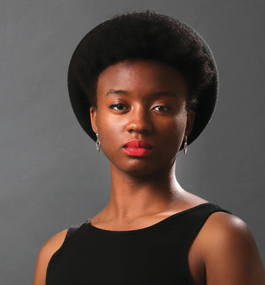
Mike Lovett
page 4 of 9
Nyah Macklin ’16
Macklin, whose first name means “war goddess,” was president of the undergraduate Student Union, and logistics and finance director for the Brandeis Diversity Conference 2016. The 21-year-old AAAS major was born and raised in New Haven, Connecticut.
Some people were thinking about losing academic scholarships, academics going down the drain and being put on academic probation. It was a very real threat that the police would be involved, and we all know that black bodies and the police have not had a great relationship historically.
My mother said, “Nyah, you’re trying to get killed,” and she was crying on the phone with me, and a number of black parents were crying on the phone with their children, because they knew that we were putting our bodies at risk, that we could easily be taken out for this work. Fighting for freedom is a struggle, and it’s one in which you are literally putting your body on the line. So my mother was constantly telling me, “Can’t lose my baby. I can’t lose my baby. Don’t do it.” Many of the students went home because they did not want to put their families through that.
We occupy a particular space here at Brandeis, more socially conscious, I would say. There are people here who are trying to understand, who are willing to listen. I transferred from Goucher College, in Baltimore, and I came one day to visit a good friend of mine. We sat down in the lunchroom, and she introduced me to a couple of her friends, who asked me about controversial issues that I’d like to talk about over lunch. And I was really surprised that students were taking on some of the most controversial issues in the larger society, and that showed me that this investment in social justice that Brandeis preaches not only happens in the classroom, but it happens at all times. That’s what drew me to the school. What I am satisfied with is that we have elevated the conversation about race on this campus.
[Macklin edges forward in her seat and taps the table lightly for emphasis.] A lot of the flak I got during the sit-in was, “You’re not representing everyone. You’re just representing black people.” To me, that’s sad, because they don’t understand that by representing black people I’m representing everyone. When you uplift the most marginalized, you uplift everyone.
Macklin says she wants to run for a U.S. Senate seat someday: “I am going into politics now, and I didn’t think that I would prior to this.”
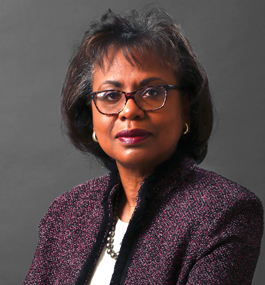
Mike Lovett
page 5 of 9
Professor Anita Hill
Hill is University Professor of Social Policy, Law, and Women’s and Gender Studies.
I have taught many of the students who were involved with the movement, so I knew them to be serious and thoughtful. If they were protesting, I knew they had carefully considered their demands and were approaching the protest purposefully. I’m committed to greater inclusion and diversity at Brandeis. While this was their protest, I wanted to support them, because our fates are linked and our goals are shared.
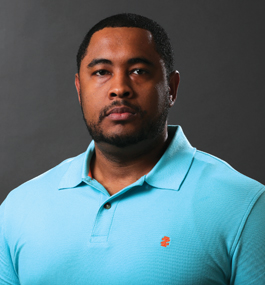
Mike Lovett
page 6 of 9
PhD Candidate Stephen Alkins
A PhD candidate in neuroscience, Alkins grew up in Boston and graduated from Morehouse College, in Atlanta. He is president of the Graduate Student Association (GSA) and has served on the university’s Strategic Planning Steering Committee and the provost’s Diversity, Equity and Inclusion Steering Committee.
It started with everybody scouring their emails when we all got wind of the list of demands from the students — so I immediately emailed President Lynch to lend my support in whatever capacity I could. I didn’t know the students directly involved, but I told her if there’s any way that I can help, then I will. I was hearing that this group was protesting to improve diversity and inclusion on campus, and my first instinct, especially as the only African-American male in any of the life-sciences graduate programs here, was, “All right, well, let’s all sit down and have a discussion about this. Let’s really improve it.”
However, as the GSA president, I had this position: While I support the ethos of the protest and the right to protest, with the group demanding changing the makeup of faculty or pursuing a particular ethnic population for student recruitment, among other things, it behooves you to be cognizant and have the input of not just those in support of #FordHall2015 or those invested in it directly, but also those who are outside the protest, because these are changes that would affect the larger Brandeis community.
Unfortunately, the way I was viewed throughout and even after the negotiations by members of the #FordHall2015 negotiating team, I wish I could say it another way, but it was with a sense of hostility. Partly, I think it was because they didn’t know me. It took me aback a bit that what was suggested was that I should not have been there in the first place.
I disagree with that sentiment. It’s imperative that if you’re going to have a conversation about and implement decisions around diversity and inclusion that you are actually, in fact, inclusive of all the perspectives and opinions that surround it. Regardless, we must continue to work together, and this protest is indicative of the tough conversations and roads that lie ahead for Brandeis. I look forward to meeting those challenges.
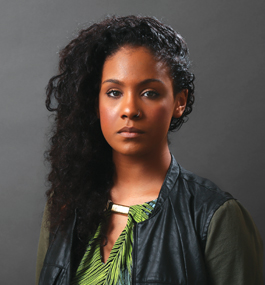
Mike Lovett
page 7 of 9
Bronte Velez ’16
Velez, 22, who self-identifies as black and Latina, is from Atlanta. “Bronte” means “thunder,” a name that many of her friends view as auspicious for her role as a leader of #FordHall2015. Velez designed her own major, a combination of dance, history and writing she named “the Arts, Ideas and Community.”
People were coming into the [occupied] space being really violent, demanding and violent as in micro-aggressions. They’re coming and, you know, [asking,] “What’s going on here? I want to know.” You know, [as if they] were very entitled to space. I realized I’m going to stop fighting with people who believe that racism is an opinion. I’m fighting about facts, and so that’s when I realized I’m not about to fight someone who doesn’t realize they’re punching me in the face.
This has never been about something that came out of the blue. We are demanding that people really live up to the things that they say they’re going to do, that they say they believe in. This school prides itself on social justice, and so are you going to do what you say you really care about? But I think we have to make our own kind of freedom. We have to take a stand.
During the protest, everyone’s passing the sheet around naming our demands aloud, and Interim President Lisa Lynch kind of was speaking to us as we’re all sitting. It’s very close quarters, and she’s tearing up.
Over the past year during her studies abroad, Velez observed Roma protests in the Czech Republic and indigenous people demanding rights in Ecuador. These uprisings, along with #FordHall2015, have convinced her of the power of grass-roots politics to bring about community change. She says, “I’m thinking now about becoming the mayor of Atlanta.”
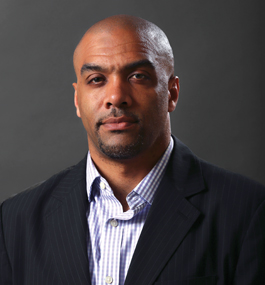
Mike Lovett
page 8 of 9
Associate Professor Chad Williams
Williams is chair of the African and Afro-American studies department.
Our faculty immediately recognized the necessity of issuing a strong statement from the department, given our unique history in being established out of the 1969 Ford Hall occupation, combined with the fact that many of our students were directly involved in the protest. At the same time, my support was also personal. Having once been in the same place as the Ford Hall students when I was an undergraduate — protesting for institutional change and administrative accountability to the concerns of students of color — I knew the value of individual and collective faculty support.
Black and Latino faculty at Brandeis are severely underrepresented. While we have made some very important strides in recent years, much work remains to be done. This is why increasing the number of black and Latino faculty was one of the first demands of the #FordHall2015 protesters.
Achieving social and racial justice […] requires leadership, courage, moral grounding, and a willingness to engage in both critical self-reflection and hard truth telling. I hope Brandeis is up for this challenge.
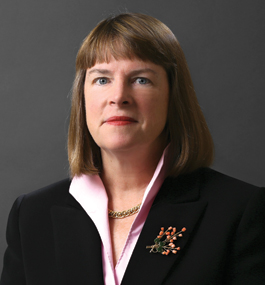
Mike Lovett
page 9 of 9
Former Interim President Lisa M. Lynch
A labor economist, Lynch came to Brandeis as dean of the Heller School for Social Policy and Management in 2008, and was named provost and chief academic officer in 2014. She served as interim president from July 1, 2015, until June 30, 2016, when she resumed her position as provost.
We had a buildup over the course of the fall with a series of student rallies that actually were a continuation of student, faculty and staff rallies and conversations from the previous year related to the Black Lives Matter movement.
To have our campus, and our students, and our faculty and staff rallying together and raising their voices on issues of racial injustice is actually, I would say, in the finest spirit of Brandeis. […] It really speaks to the founding values of this institution as a place open to all — a place where people would come to learn or to teach on the basis of their merit, not any other way that somebody might categorize them. […] To see our community rising up in fall 2015 was something that was not unexpected. I actually viewed it as a very positive thing for the campus.
Our students provided testimony about their individual experiences on campus, and how they had felt disconnected from campus and excluded at various stages of their education and living experience here. While we think of ourselves at Brandeis as having social justice in our genes, it was clear that the experience of many of our students on campus was not in sync with this.
So I wasn’t surprised when the students walked down from the Rabb steps and into the administration building. […] We had several tense moments in the initial occupation. But, through the occupation, I just kept thinking, These are my students. This is why I’m here at the university — to make sure that we have the best academy and support our students in their intellectual and personal development, and clearly we’re not doing our job and I need to listen.
An educational institution cannot call itself excellent if it does not represent diversity of experience, thought and contributions. That’s how universities advance knowledge. But it’s not enough to just say, “Welcome to Brandeis.” You have to do more to reach out and make all members of our community feel part of the community. You can’t be passive about inclusion. You have to be actively engaged to have an inclusive community.
